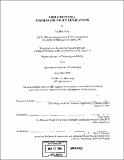Grid computing : business and policy implications
Author(s)
Ong, Sze Hwei, 1979-
DownloadFull printable version (3.149Mb)
Other Contributors
Massachusetts Institute of Technology. Technology and Policy Program.
Advisor
Amar Gupta.
Terms of use
Metadata
Show full item recordAbstract
The Grid is a distributed computing infrastructure that facilitates the exchange of expertise and resources. It is somewhat analogous to the electric power grid in that it can potentially provide a universal source of IT resources that can have a huge impact on human capabilities and on the entire society. Currently the Grid is being deployed (in limited ways) in some research and academic institutions. As Grid computing technologies mature further, the commercial sector can also benefit. With Grid technologies enabling utility computing, enterprises will be able to access IT resources on-demand in a utility-like way. This thesis gives a brief introduction on Grids and looks back into the history of power grids for lessons learned. It suggests that the Grid and the power grid are both infrastructures and factors of reliability, standardization, universal access and affordability are necessary to ensure the success of any infrastructure. Once the Grid is successful, it can open up new opportunities in the field of utility computing and impact IT provision in the commercial sector. The new utility computing ecosystem would consist of five major players - the Grid resource supplier, the Grid infrastructure supplier, the utility service provider, the re-seller and the end user. Further industry analysis reveals that there are new roles for current players in the traditional IT provision industry and opportunities for new entrants in this new ecosystem. The thesis attempts to identify the characteristics of each of the five major players to help the IT industry better understand the requirements of these new roles. Current players in the IT provision industry would have to decide which of the above roles to play in this new utility computing ecosystem and to re-define their market strategies accordingly. New entrants to the field would likely be players in the telecommunication sector who want a share of this growing pie and whose existing relationship with bandwidth subscribers can be leveraged upon. This thesis concludes with recommendations on several policy issues: Grid standardization for inter-operability, decentralized Grid governance to encourage optimal resource sharing and mechanisms for transcending cultural/organizational barriers inhibiting the commercial adoption of Grid computing.
Description
Thesis (S.M.)--Massachusetts Institute of Technology, Engineering Systems Division, Technology and Policy Program, 2003. Includes bibliographical references (leaves 84-86).
Date issued
2003Department
Massachusetts Institute of Technology. Engineering Systems Division; Technology and Policy ProgramPublisher
Massachusetts Institute of Technology
Keywords
Technology and Policy Program.